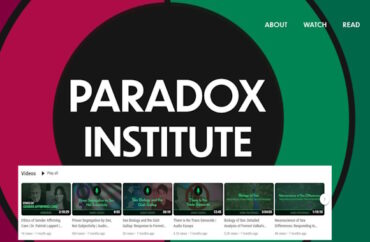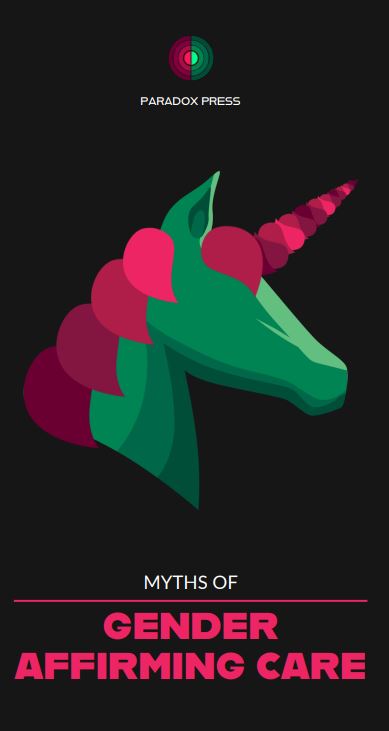
A team of self-styled science communicators are taking a stand against what they view as outright science denial through their new organization, The Paradox Institute, which works to inoculate young people against falling for gender spectra ideology myths and falsehoods.
The institute produces educational materials on the biology of sex that young people find easy to digest, aesthetically pleasing, and “backed up by science,” said founder Zachary Elliott in a telephone interview with The College Fix.
The materials include written and audio essays, pamphlets, short animated videos, and podcasts on topics like the “The Denial of Biological Sex,” “Why Sex is Binary,” and “Defining Sex vs Determining Sex.”
“The denial of the two sexes is one of the fundamental issues of our time,” the institute’s website states.
As the cultural landscape remains saturated with casual rejections of the basic science of sex by young people, educators and policymakers, Elliott said he hopes The Paradox Institute will continue to grow from its roots in 2020.
In the offing are plans to develop a publishing wing to work with authors looking to put out books on topics related to sex and gender, he said.
The standard age-range for the site’s audience is late teens through late twenties, he said, adding it’s vital the upcoming generation is “educated in the biology of sex and sex differences, so we’re really happy that we’re reaching that audience.”
“We’re also reaching parents who have kids with gender dysphoria, providing them with good information,” he said.
The institute has consulted with evolutionary biologists such as Colin Wright to ensure the organization’s content is consistent with the current scientific literature.
“I’d definitely recommend it to anyone seeking scientifically accurate information on the biology of sex,” Wright told The College Fix via email.
In 2022, University of Chicago evolutionary biologist Jerry Coyne similarly praised The Paradox Institute as “a site that looks to be a gold mine of information on human sex, how sex evolved, why there are only two sexes, and on the various disorders of sex development.”
 One effort by the institute that Elliott said he is particularly proud of is a pamphlet campaign to help combat myths related to so-called gender affirming care.
One effort by the institute that Elliott said he is particularly proud of is a pamphlet campaign to help combat myths related to so-called gender affirming care.
Asked why he believes so many young people are embracing gender ideology regarding sex and gender spectra and experimenting with different identities, Elliott said there’s a component of “a genetic-slash-environment thing and how somebody was raised and their predisposition towards things.”
“But there’s also a big portion of it right now where it’s definitely more of a social contagion.”
Many young people, he said, are experiencing feelings of anxiety, isolation, and alienation, as well as dissatisfaction with how they look. The gender industry, he said, gives them something to latch on to in the hope that it will solve their problems. When peers start talking about changing their gender to solve their problems, this reinforces the appeal, he said.
However, it’s not just troubled teenagers who are embracing the larger ideology, Elliott noted: “It’s people across the board from every demographic.”
“People latch onto ideas that they see as fashionable and they’re people who are very pulled by the culture and the times of the culture. And that’s happened throughout history,” Elliott said.
Elliott’s “fascination with the biology of sex and desire to learn and educate led him to create the Paradox Institute in January 2020,” the website states.
“There’s a term I like called ‘fashionable nonsense,’ and I believe it was coined by Alan Sokal, a physicist who wrote some fake papers that actually got accepted into elite journals, to show the nonsense at the core of the growing postmodernist ideology at the time in the 90s,” Elliott said.
He likened gender spectrum ideology to “fashionable nonsense.”
“Maybe there are some half-truths in it,” he added, “like, for example, the sex spectrum idea tells you that there’s this spectrum in diversity between male and female. Well, there’s diversity within male and female, but it’s within males and within females.”
“They try to pull on these half-truths and then they extrapolate out these major conclusions that are just complete nonsense,” Elliott said.
“It’s a very appealing notion, but when you actually evaluate the claims in detail and understand the scientific literature and the evidence, it’s all on a foundation of sand. It’s not based in reality.”
Other members of The Paradox Institute team include graphic designer Cynthia Breheny, neuroscience PhD student Sammy Stagg, and Talia Nava, who is described on the institute website as having an educational background in cognitive psychology and medical anthropology.
MORE: Author of ‘Transgender Craze Seducing Our Daughters’ offers parents advice
IMAGES: The Paradox Institute
Like The College Fix on Facebook / Follow us on Twitter






Please join the conversation about our stories on Facebook, Twitter, Instagram, Reddit, MeWe, Rumble, Gab, Minds and Gettr.